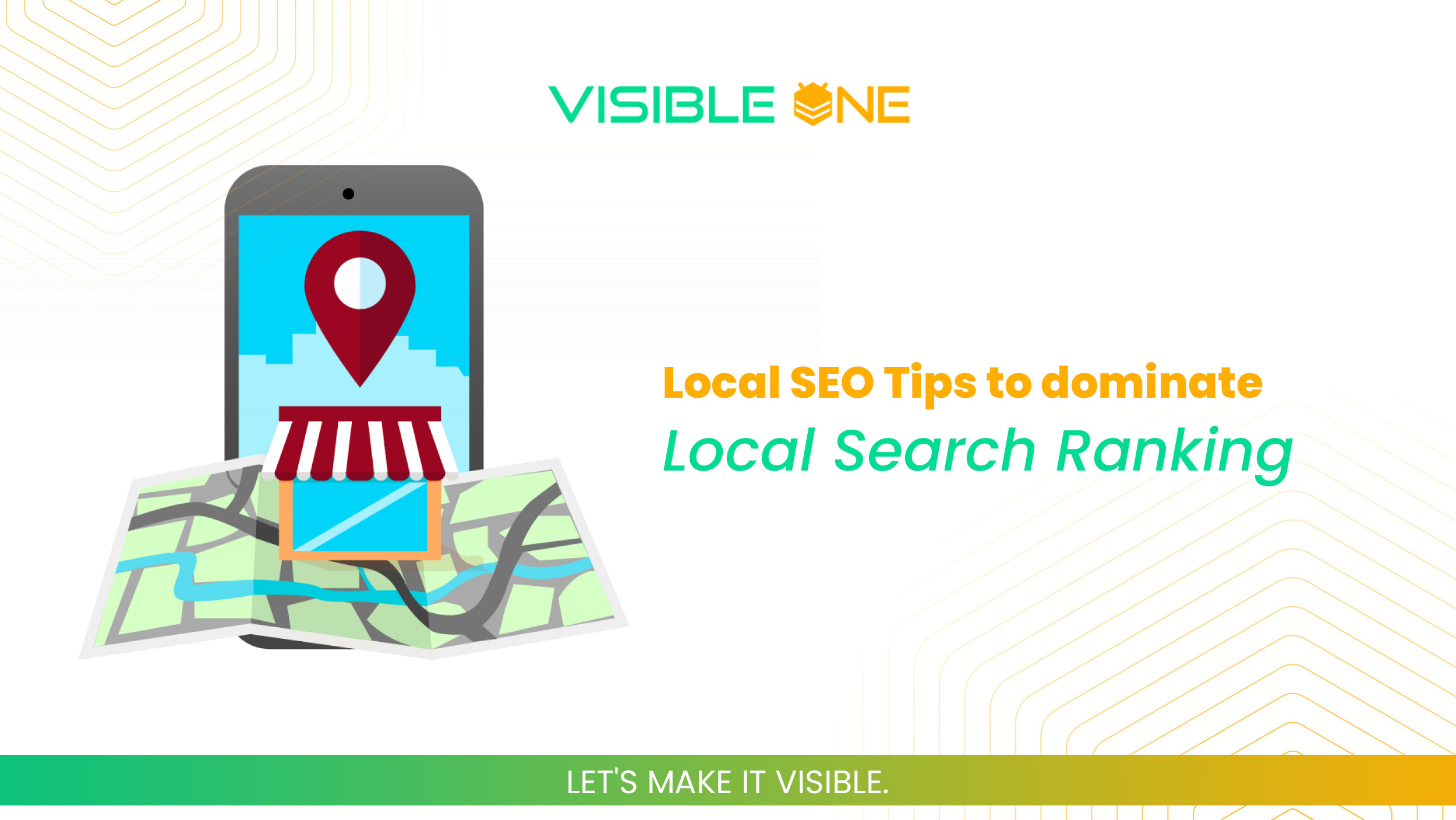Local SEO Tips to dominate Local Search Ranking

Almost every business in the world has a website these days, and that means small businesses have to conquer nearly insuperable odds to claim one of the few spots on the first pages of search engine Local results.
If you do business for the most part in your town, your marketing efforts ought to be hyper focused on Local SEO. You’re only targeting a very selected group of people so, when those people go out there looking for a business in their community, you want to show up, right? However, not just show up – dominate – be seen as the obvious choice in the sea of wanna-be competitors!
If you desire to stand out and dominate for your category of business there are a handful of fundamentally local practices that you must embrace and invest time and energy in mastering.
Here are six tips and tactics on local SEO to help you dominate local search rankings.
1. Create Local Content
Creating content, however, does not mean writing more about your products and services. If you want to employ content as a tool to drive local traffic then you have to compose your content both useful and local.
Yes you have to add local maps, local directions, address data using Schema format, but none of that will matter in terms of engagement if you’re not writing about things that local people want to know about.
In addition, you’ve got to think about ways to hold close the community further than what you sell – Talk about neighborhood block parties, cover local charities and get behind the local sports teams. Some might disagree how useful this kind of content seems, but remember relevance is, well, relevant.
Getting involved in the community where your customers live and work has always made sense from a business standpoint and it makes sense from a content and local search standpoint as well.
2. Choosing Your Keywords
In general the search engines act like a virtual librarian, they file all your web pages, blog posts, images and videos in a massive library in cyberspace. Optimizing your website is simply the process of telling the search engines where to file everything; so that when your prospective clients or customers are searching for what you have to offer they can find you easily. As per your physical location, being difficult to find is a bad idea. Choosing the right keywords is very important and unless you are very familiar with SEO it may pay to outsource this research to an SEO specialist.If you are a local business, selling local products or services make sure that your selected keywords include the name of your city or county. This will make you easier to find on Google’s new personalized search results.
3. Get Registered On Local Directories
You’re certainly familiar with the local search directories produced by Google, Yahoo and Bing.It’s essential that you get your business registered on local directory sites like Yellow Page. But, you may not be aware of the fact that there are hundreds of generic, industry-specific and local directories out there providing data points for the big search engines.
A good place to start are with the five best local directories once you have updated your business information in all those directories, you can move on to industry-specific directories.
| Singapore Yellow Pages | Singapore Yellow Pages |
| Singapore Expats | Singapore Expats |
| sg.Kompass.com | sg.Kompass.com |
| SME Toolkit Singapore | SME Toolkit Singapore |
| AsiaXpat Singapore | AsiaXpat Singapore |
| Zipleaf Singapore | sg.Zipleaf.com |
| Angloinfo Singapore | Angloinfo Singapore |
| The Green Book | The Green Book |
| Times Directories | Times Directories |
| Singapore Business Federation | Singapore Business Federation |
| HotFrog Singapore | HotFrog |
| inSing | inSing |
| Directory Singapore | Directory Singapore |
| STclassifieds | STclassifieds |
| Yalwa Singapore | Yalwa Singapore |
| BusinessList | BusinessList |
Here’s a list of the top directories and local citation sources for Singapore.
Getting your business listed, accurately, in these directories is a great way to add data points for local search. If you don’t claim your listing in many of these directories you do risk the chance that someone else might.Here’s a list of some of the top directories and local citation sources for Singapore.
4. Capitalize On Social Media
Social media, online and offline networking play a big role in making all of this come together. Social signals are also very important for page ranks. Every time someone likes, shares, or follows a post, image, or video, it sends a social signal to search engines, which will help you gain credibility on your third party website. You need to be on as many platforms as possible and interact with local followers regularly. Advertise local events, sponsor local teams, and offer discounts for residents and share that information with everybody via social media.
Don’t forget the power of local social groups.
Participating in locally focused groups on networks such as LinkedIn can be another great way to find other people’s content and make mutually beneficial local connections that might start with links and sharing and blossom into something much bigger.
The bottom line in all of this is that ranking highly for local search takes consistent work, but it’s not that hard or technical for the majority of small local business out there.
5. Get Reviews From Local People
Getting reviews for your business is no easy feat. Even raving fans don’t seem to make the time to login and write reviews and most of the review engines don’t want you to do anything to stimulate reviews.Getting reviews from your customers can be tricky but they are great for your SEO as they improve the weighting (value) of your local links.
You can’t force people to write reviews and you cannot insist that their reviews are positive but you should always invite feedback and let your local customers share the good news of your brand through online word of mouth.
Finally, take reviews seriously as they might be one of your most important local assets. Respond to them good or bad – particularly bad. Thank your customers for providing them – send them a thank you card offline! Build them into everything you do and you just might find the mindset forces you to provide an even more review worthy experience.
6. Go Mobile
An alarming number of small businesses seem to think they don’t need to build a mobile-friendly website. It’s something we in the business hear all the time, and it’s mind-boggling.
Just because your website looks fine on your smartphone doesn’t mean it’s actually mobile friendly in the eyes of Google. To determine whether your website is mobile-friendly, consult with an experienced digital marketing team. There’s more than one way to go mobile: you can choose to design a responsive site, a hybrid-responsive site, an adaptive site, or a separate mobile site. There are also all kinds of reasons not to rush into getting your mobile website set up. A full-fledged mobile-friendly website should be built to serve your marketing and sales objectives.
There are a lot of factors to consider when going mobile, so be sure your marketing and development teams have a solid strategy in line with your company goals. Don’t ignore mobile. In fact mobile just made Local SEO even more important.
By covering everything in this post you will be well on your way to being found locally. The most important thing in all of this is you have to be patient. Becoming dominant in local search is a generally inexpensive form of marketing. You will have to invest some time before seeing returns. However, those returns are long-lasting. If you find that you don’t have time or the manpower to do these things, give us a call, we can surely help you.





